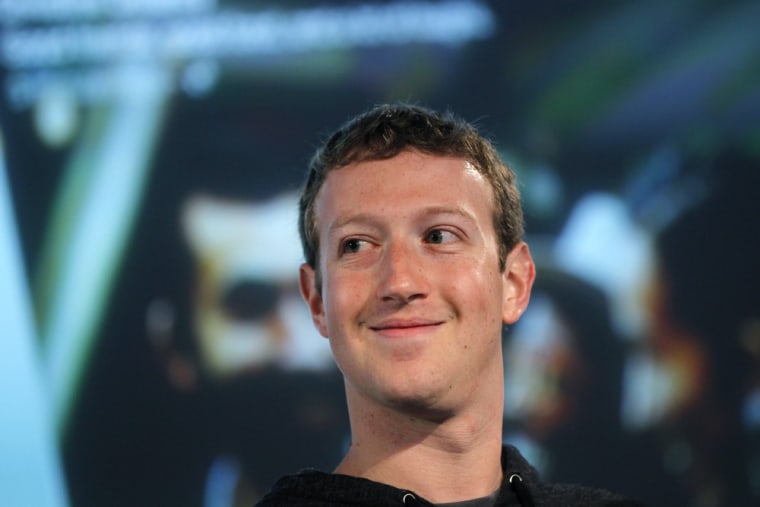Mark Zuckerberg has a plan. Like Oprah Winfrey before an infinite audience, he wants to give Facebook to everyone. EVERYONE. You get Facebook! You get Facebook! And you get Facebook!
That's the takeaway from the Facebook CEO's introduction of Internet.org, a Facebook-led initiative to bring the mobile Internet to the two-thirds of our planet population currently without access.
"For nine years, we've been on a mission to connect the world. We now connect more than 1 billion people, but to connect the next 5 billion we must solve a much bigger problem: The vast majority of people don't have access to the Internet," Zuckerberg posted on his Facebook wall Wednesday morning, along with the Internet.org mission statement,"Is connectivity a human right?"
Let Bill Gates deal with malaria-carrying mosquitoes, potable water and rural poo removal. Without a data-efficient Facebook app (and the accompanying mobile ads), how will people in Equatorial Guinea know which ugly tchotchkes they need to buy from Fab.com?
That's not to say Zuckerberg's "plan" is just a marketing push for the social network, which is enjoying its fastest growth in Brazil, India and Indonesia. Facebook, along with mobile tech giants Qualcomm, Ericsson, Nokia and Samsung, among others, pledge launch joint Internet.org projects to develop inexpensive smartphones and economic apps that require less data to run. Though the details have yet to emerge, the plan is this:
- Streamline the technology used by area mobile service providers, upping efficiency while cutting expense of the pre-paid data plans commonly used in areas with low connectivity.
- Build software that compresses the data required by large mobile apps.
- Address "social and cultural issues" i.e. making sure everybody know how awesome cellphones are so they'll totally want one.
Cloaked in the mantle of benevolent savior, Internet.org was announced with yet another maudlin video from the infinitely self-congratulatory Silicon Valley. This one comes with the requisite tinkling piano, a mash-up of real people reenacting Disney's "It's A Small World" ride and a cut-and-paste version of John F. Kennedy's 1963 Cold War speech at American University, wherein he predicts a world where people in even the most thirdiest of third world countries have Facebook. Only through universal membership to the world’s largest social network can humanity have peace, says the dead president. (I'm paraphrasing.)
This is not to say that global Internet connectivity via mobile phones isn't important, and maybe even vital. People in the U.S. who can't afford Internet access are increasingly cut off from society. In Africa, mobile phones connect people in the most remote regions, and even serve as engines to grow fledgling economies. Because the phones are banks, the added benefit is a decrease in crime, since merchants are carrying less money. "What was once an object of luxury and privilege, the mobile phone, has become a basic necessity in Africa," Paul Kagame, president of Rwanda, said in 2007.
For all the third-world benefits of Internet connectivity celebrated by Internet.org, the one Facebook and its partners doesn't mention is its proven use as a tool of fomenting revolution. No surprise here — Facebook never congratulated itself during the "social media revolution" of Arab Spring, and has bounced more than its share of pseudonym-reliant dissidents — but Facebook and friends coyly allows us to fill in the blanks. Still, as Vint "Father of the Internet" Cerf wrote in 2012, the Internet is a "tool" for the human right of free expression, even if it's not a right all by itself.
Google — increasingly Facebook's chief competitor — launched it's own effort to be "FIRST!" in all-access with Project Loon, an Internet experiment with antenna-bearing helium balloons. For all their posturing however, both outfits neglect to mention the price of Internet access, their privacy. Nevermind the mobile ads, wide-spread connectivity also provides governments the ability to monitor its citizens.
"The erosion of individual privacy in the West and the attendant centralization of power make abuses inevitable, moving the 'good'societies closer to the 'bad' ones," Julian Assange wrote. He was commenting in his review of "The New Digital Age," a book written by Eric Schmidt, Google's executive chairman, and Jared Cohen, former adviser to Condoleezza Rice.
"The book proselytizes the role of technology in reshaping the world’s people and nations into likenesses of the world’s dominant superpower, whether they want to be reshaped or not," Assange said in the piece, which ran June 1 in the New York Times. It was mocked by the technorati as fraught with paranoia. Less than a week later, NSA leaker Edward Snowden was headline news.
This new plan may have its virtues, but corporations are behind it, so the motive must be sought. Facebook may not be out to take money from the currently unconnected masses. But it wouldn't mind making money from them. And they want to look good doing it. Cue JFK.
Welcome to Facebook, rest of the world. It's gonna be awesome!
Helen A.S. Popkin goes blah blah blah about the Internet. Tell her she doesn't know what she's talking about on Twitter and/or Facebook.
